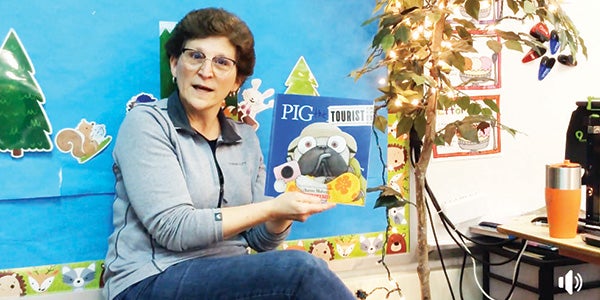With schools closed, early childhood educators adapt
Published 9:25 am Friday, April 3, 2020

- A screenshot from Merritt Elementary School’s Facebook page shows Sara Gleason reading a book for a recorded story time. The school has posted teachers reading stories, as teachers are also recording them for their students to watch at home. (Submitted photo)
|
Getting your Trinity Audio player ready...
|
BERRIEN COUNTY — From story time to learning to spell, learning has not come to a halt for students and teachers in the Brandywine Community Schools and Niles Community Schools.
Teachers have worked to move their in-person instruction and class structure into an online environment over the last few weeks. In the early learning age groups of 3- to 6-year-olds, keeping a sense of normalcy involved has been important for two area educators.
As Michigan Gov. Gretchen Whitmer announced Thursday that schools would remain closed for the rest of the current school year, Sara Gleason, kindergarten teacher at Merritt Elementary School in the Brandywine Community School system, appreciated the thought that Whitmer put into her mandate.
“I am appreciative that she has taken all of this work to really think through what is best for the kids,” Gleason said. “Teachers have never taken their jobs lightly, in the lives of children. Of course, we are all going to rise above this. We are going to do the best that we can.”
As schools shut down through the state of Michigan, as mandated to begin on March 14, teachers have been adapting their educational resources as best as possible for their students at home.
Gleason has been prioritizing providing a sense of normalcy for her students. Through a private classroom page on social media, Gleason continues to implement some of the everyday routine her students are accustomed to.
“We do ‘calendar time,’ so I’m doing calendar time with my kids, talking about the weather, which we do every day when we are in the classroom,” she said.
With eLearning in place, Gleason said teachers cannot teach new skills, but can maintain the level of education that had been attained when schools closed.
“It’s taking the classroom and giving it to the parents to make sure that they can see [what their child does every day in class],” Gleason said. “Parents are the kids’ first teachers, so why not give them some of what we’ve been doing in the classroom to work with them at home?”
Gleason has also been posting videos of herself reading books out loud to her students, as a sort of story time for students. One of the stories she has read, “Chicken Little,” came with some fun assignments for her 5-year-olds to think about.
“Right before we had left [school] three weeks ago, I had given them a book of ‘Chicken Little,’ but it was a different version than I read today,” she said. “I gave them the assignment to compare the two books.”
The loose assignment included thinking of differences between the two story versions, drawing a picture of a favorite character from the book and coming up with a fun, rhyming name. Characters in the story possess silly names like “Henny Penny” and “Lucy Goosey,” and finding a new animal rhyme name is a fun assignment for the age group.
In the Niles school District, donna Dodge, Montessori lead teacher for the Northside Child Development Center, is also working with a younger age group in a new format.
Dodge’s classroom combines 3- to 6-year-old children in one hands-on learning environment.
“Ninety percent of everything we do in our classroom is hands on,” Dodge said. “It’s all up and moving and interacting, so mine has been hard to figure out hands on learning at home when you don’t have the materials to do it.”
Spanning the age gap through online learning has Dodge coming up with creative ways to educate from a distance. She created a private Facebook group for her classroom to interact while school is out.
“I’ve been trying to do ‘circle times’ twice a week,” Dodge said. “They’re half an hour to 40 minutes long, and I’ve been trying to do one in the afternoon and one in the evening, because I do them live, so parents who do have to work can be home to interact with their kids and help them.”
In Dodge’s classroom normally, she works to have multiple activities available at once for students to experience.
“I try to do one to two language activities for each age group, and one to two math activities for each age group,” she explained.
In her class’ Facebook group, she poses challenges and questions for students to interact with their parents in real time.
She has worked to make herself available to her students’ parents as well, interacting over phone calls, emails and texts.
She finds that she is “teaching parents how to teach,” though Dodge knows that there is a lot going on in the families’ lives.
“The parents have to worry about their job, and keeping up the house. It’s a lot of balance for anybody,” she said.
Dodge mentioned that “practical life” is a section that is addressed in Montessori curriculum.
“’Practical life’ is different ways on how to basically cope in life,” Dodge explained. “I’ve been encouraging [parents] to have the children fold the laundry, and do different things around that keeps it going. It’s not just the parent’s job, it’s everybody’s job.”
As the mandates have been handed down, going forward as an educator has Dodge taking things as they come. She is continually working to come up with new ideas for activities to keep her classroom engaged, even from afar.
“Ideally, we just plan one month at a time,” Dodge said.





